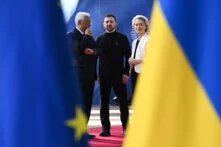The arrest of Istanbul’s Mayor Ekrem İmamoğlu has sent shockwaves through Turkey’s political landscape. Civil society has been protesting every day, amidst a media crackdown that attempts to contain the unrest. What does this mean for Turkey's democracy and the rule of law, and for EU-Turkey relations? We asked 3 Questions to Dawid Bartelt, Director of the Heinrich-Böll-Stiftung's Istanbul office.

1. Why was Ekrem İmamoğlu arrested?
The Mayor of Istanbul was arrested on 19 March on charges of corruption and supporting terrorism. Four days later, a judge ordered his pre-trial detention on corruption charges. President Erdoğan emphasises the independence of the judiciary and denies any political motive, but this is clearly the case, and the judiciary in Turkey has not been independent for some time. Imamoğlu has already won the mayoral elections in Istanbul three times and thus actually directly defeated Erdoğan, because Istanbul is Erdoğan's city. His election as Lord Mayor in 1994 marked the beginning of his national career. Imamoğlu thus has the aura of the conqueror of Erdoğan. He has gained in visibility and popularity in recent months, and was elected – albeit in absentia – as the only presidential candidate of the main opposition party CHP on 23 March. He is popular, authentic, has a can-do attitude and conservative traits at the same time, is an avowed Muslim, which also makes him electable for parts of the supporters of the governing party.
2. What other issues are pushing Turkey's population to protest?
At the same time, the government is unable to get a grip on the economic crisis with high inflation. This has been going on for years now. Discontent has grown sharply among the population, especially among wage earners – the vast majority of the population – who are suffering from skyrocketing rents and galloping prices. In this situation, Imamoğlu became an even more dangerous opponent for Erdoğan. Imamoğlu's imprisonment is another example of political injustice in Turkey. Political scientists like to describe the ruling political system as ‘competitive authoritarianism’. In Turkey, truly fair elections are no longer possible, but reasonably free ones still are.
The Turks are very proud of their freedom of choice, and voter turnout is always very high. And that has always included the possibility of actually voting out a government. The local elections a year ago showed this when the AKP suffered heavy defeats. Corruption – especially in the cities governed by the AKP – actually played a major role in that, which is why this accusation against Imamoğlu was deliberately chosen. Corruption also exists in municipalities governed by the CHP, but in recent elections, it became the strongest force nationwide, now controlling all the largest and most important cities. Erdoğan's AKP was punished.
The protests are currently increasing daily, despite a general ban on demonstrations and although more than a thousand people have already been arrested during the protests. It remains to be seen whether they have enough stamina and strength to persuade the government to give in. It could be that we are at a turning point: the future of democracy in Turkey is now at stake.
3. What does this unrest mean for EU-Turkey relations?
Erdogan's government has recently moved closer to the EU rhetorically. Turkish Foreign Minister Hakan Fidan took part in the London Ukraine conference at the beginning of March. Three weeks ago, the Turkish ambassador in Berlin told me that his priority was to bring Turkey into the EU. Even president Erdogan started to talk about EU accession again. The EU and Turkey need each other. Turkey confidently says that Europe needs it for a new European security system. Turkey is militarily strong, with the second largest army in NATO. However, Erdoğan has now taken a further major step towards a fully authoritarian state. The dialogue must continue, yes, but the EU's response must be clear and loud and must not result in the transactionalism practised so far simply continuing in secret.
Many observers here in Turkey fear that Erdoğan has now embarked on a path from which there is no turning back. The EU cannot simply accept this, if only in its own interest. It needs Turkey for a new European security architecture, but not a Turkey shaped in Trumpian categories, only a Turkey that is once again on the path to substantive democracy and the rule of law. Trump's Middle East envoy Steve Wittkoff, after a recent phone call between Erdogan and Trump, described US-Turkey relationships as ‘transformational’. This is what EU-Turkey relations should return to: to be transformational, not just transactional. Both the EU and Turkey need that to happen.


